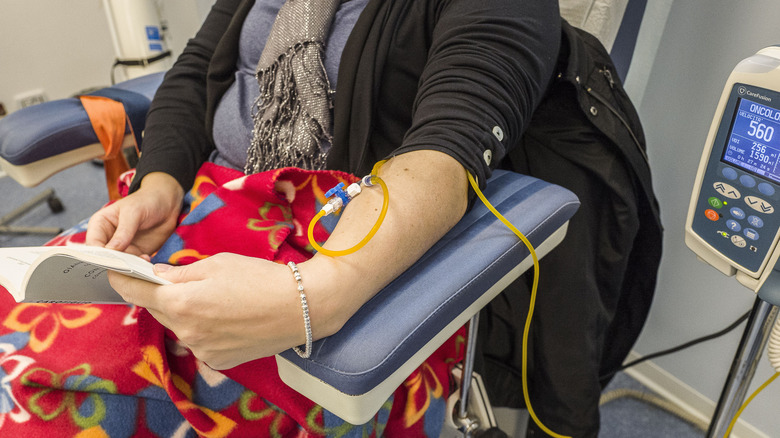James Conner's Cancer Diagnosis Explained (And How He Overcame It)
In December 2015, professional football running back James Conner was diagnosed with Hodgkin lymphoma. At the time of his diagnosis, Conner was just 20 years old and had yet to begin his professional football career. While everyone who's diagnosed with cancer deals with the news in their own way, Conner chose to take the defiant route, saying during his cancer announcement, "I choose to not fear cancer... I will play football again." In May 2016 — just six months later — Connor announced he was cancer-free and fulfilled his promise to return to the field.
But what fans and media didn't know at the time, was that Connor's cancer was far more aggressive than he had initially let on. As he later shared on a podcast in 2019, "[The doctor] said you got about a week if you didn't get this treated," Conner said, per CBS News. "You had about a week, at the rate it was growing." The tumors that were discovered were around his heart and growing rapidly. Due to this location and the stress that any professional athlete puts on their body, especially their heart, Conner narrowly escaped possibly dying on the field because the cancer was found just in time. This also meant that treatment needed to begin immediately if Connor were to have a chance at a full recovery — and fulfill his dream of playing professional football.
James Conner's diagnosis of Hodgkin lymphoma
Hodgkin lymphoma is a cancer of the lymphatic system, which is part of the immune system and plays an essential role in warding off germs, viruses, and other types of illnesses. Although doctors aren't really sure why someone might get Hodgkin lymphoma, it has been found to be more prevalent in men, those in their 20s and 30s, and people over 65. A family history can also contribute to it, according to the Mayo Clinic.
The American Cancer Society reported that 2024 saw 8,570 new cases of the disease and in that same year, 910 people died from it. Like many cancers, Hodgkin lymphoma can be sneaky. Although the most common sign is swelling of the lymph nodes, because these bumps rarely hurt, it can be easy to dismiss them. Other symptoms of Hodgkin lymphoma include fatigue, fever, rapid weight loss, night sweats, and/or loss of appetite.
In Connor's case, he was recovering from medial collateral ligament (MCL) surgery when he began excessively sweating at night, and then a bad cough developed. Assuming it was a sinus infection or something similar, his team of doctors ran some tests and also did an X-ray of his chest which showed that Conner had a mass in his torso that shouldn't have been there. A biopsy was conducted that confirmed he had Hodgkin lymphoma, per Sports Illustrated.
How James Conner overcame Hodgkin lymphoma
Over the course of six months, Conner received 12 rounds of chemotherapy. As he told Sports Illustrated in 2016, he would vomit after each chemo session, but despite being given the opportunity to have a private area in which to experience any possible side effects, Conner turned it down. "I didn't want to be isolated from anybody," Connor told the magazine. "I'm no different."
Even as his body suffered the toll of the chemotherapy, Conner continued to exercise. "The day after [chemo], many patients spend it taking it easy," Dr. Stanley Marks, who treated Conner at the University of Pittsburgh Medical Center told USA Today Sports. "He would go and workout. I emphasized to him the importance of staying active and working out with obviously limitations based on his fatigue, but he took it to an extreme." Conner also remained positive through it all. While there's no scientific proof that positive thinking is going to "cure" anyone of anything, being optimistic can help people manage their cancer in a more productive way.
It should also be noted that, unlike most Americans, Conner was receiving top-notch care. Although his professional career had yet to begin, his college record proved he had the talent to make it, meaning finances weren't probably much of a concern for him, as it would be for others. When you're able to eliminate that stressful aspect of being sick, it can create a positive shift in your mindset. Conner overcame his cancer because he had great doctors and proper medical care and remained positive every step of the way through his journey.


